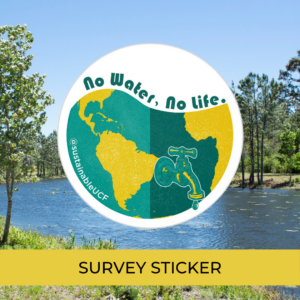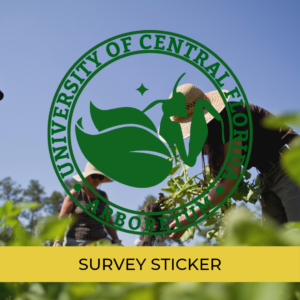Strategic Planning
UCF created its first Climate Action Plan in 2010, outlining our path to the carbon neutrality. Since then, we’ve made significant strides in creating the infrastructure that will get us there. At UCF, we have a myriad of interdisciplinary faculty, staff, and students employing a systems approach to key sustainability opportunities. The efforts sparked by our Climate Action Plan has led to 40 percent reduction in energy consumption per gross square foot, several solar-power installations, a STARS Silver designation, and numerous innovative research collaborations.
In March of 2021 Sustainability Initiatives launched a new sustainability strategic planning process. In addition to prioritizing emission reductions, the new plan will center cultivating resilient communities and building sustainable industries through research and talent. The process will result in goals and high level strategies in the areas of academics, energy and the built environment, landscape and natural resources, transportation, and waste.
We want to hear from you!
We have two opportunities for you to share your vision for a sustainable UCF. As a thank you, we are giving away special edition stickers
Draft Goals: Review the proposed goals for the plan and share your support or suggestions for improvement. This survey will close February 2, 2022. Watch the January 21 Virtual Town Hall to learn about the draft goals.
General Sustainability at UCF: This survey serves to gather perceptions of UCF’s sustainability and to rank priorities moving forward. This survey will remain open through Spring 2022. Also available in Spanish.
Have a question you’d like to submit for our FAQ section? Submit your questions below or email us at stainable@ucf.edu.


Planning Goals
- Establishing roles and responsibilities for implementing the plan
- Developing a shared vision and goals
- Creating mechanisms for implementing and tracking
- Prioritizing emissions reduction
- Increasing community awareness
- Developing broad support from stakeholders
Process
- Determine five focus areas
- Build on current success and university priorities
- Inclusive facilitation via committees, town halls, and surveys
- Ongoing engagement opportunities
Frequently Asked Questions
Check back for more answers to questions posed during the town hall and submitted by email. Use the form below you ask your sustainability and strategic planning questions.
Academics
The UCF campuses a filled with built and natural assets that, when paired with research and curricula, provide unique learning experiences. Some examples include
- Faculty using our network of stormwater ponds to teach students the basics of water quality testing.
- Facilities & Safety sharing utility data with researchers for micro-grid modeling.
- The Arboretum providing a home for student projects testing the boundaries of urban agriculture.
Data capture continues to be an obstacle for improving our STARS score. The Association for the Advancement of Sustainability in Higher Education (AASHE) outlines specific criteria for sustainability focused and inclusive courses and research. These criteria are not readily tracked, likely leading to an undercount of activity. Additionally, there a currently no requirements, incentives, or training to assist faculty in curriculum integration on a university-wide scale.
Energy & the Built Environment
UCF’s Department of Utilities and Energy Services’ Green Building Construction and Renovation Requirements state all new construction and renovations projects will be registered with the US Green Building Council (USGBC), and meet a minimum Leadership in Energy and Environmental Design (LEED) Gold rating, utilizing version four, or (latest) with ANSI/ ASHRAE/ IES Standard 90.1 2010 as the building baseline. To ensure both design and quality meets the owner’s intent, both the design and construction teams shall adhere to the latest ASHRAE Standard for Building and System Commissioning.
Due to the risks posed by the pandemic, Light Up UCF was not held in 2020 and will not return in 2021.
Landscape & Natural Resources
UCF has abundance of milkweed on campus as a result of actively managing the university’s land with prescribed burns. The Arboretum continues to plant pollinator gardens through the Learning by Leading and Bee Campus USA programs. Additionally, Landscape and Natural Resources heavily incorporates native and Florida friendly plants in landscape design. Unfortunately, cultural standards for manicured landscapes limits the use of some pollinator friendly varieties in high profile areas. Shifting the community’s expectations and perspectives of what we think is beautiful could open the door to incorporating more wildness into our landscapes.
The Arboretum collaborates with Landscape & Natural Resources (LNR) to make the campus an outdoor, living laboratory that provides opportunities for research and education, experienced-based learning, and human connection to the natural world. Acting as LNR’s student engagement arm, the Arboretum offers a variety of volunteer, internship, and research opportunities. To learn more, click here.
UCF collects the green waste generated by trimming plants and trees. Landscape & Natural Resources has a site on campus where these organic materials are stored. A contractor picks up the materials and it composted, diverting the material from the landfill. Additionally, large tree removals are turned into mulch to use in the Arboretum for trails and pathways.
The stormwater ponds on campus are indirectly connected, in that they flow into natural systems that eventually drain into the Little Econlockhatchee River. The ponds don’t typically interact with each other in terms of water volume. During a rain event, stormwater runoff flows into underground pipe infrastructure to a manmade stormwater pond. From there, the water flows from one end of the pond to the outflow on the opposite end of the pond, which is typically a canal, stream, or wetland system. With the exception of the ponds that flow into the two naturally occurring lakes on campus (Lake Claire and Lake Lee), all campus stormwater flows north through the wetland systems on the east side of campus into the Little Econ.
Transportation
Based on the League of American Bicyclist’s rating system, our infrastructure is in good shape, but we aren’t doing enough to promote bike usage. To get to Silver we’ll need to:
- Grow Bike N’ Gold, Student Government’s free bike library.
- Fund a dedicated bike coordinator position to work on growing the bike population in the community. This position can be expanded to include other areas of sustainable transportation.
- Identify and work with outside governmental bodies to improve the surrounding roadways so students living in apartments can easily and safely ride bikes to campus.
- Improve and expand bike parking options.
- Create and maintain a dedicated website focused on bike friendliness.
- Continuously improve the bike paths and trails on campus.
The process to install new EV charging stations on campuses is complex. The location, metering, cost of the machine, smart data annual subscriptions, and collaboration with Facilities and the local energy provider for installation are considered.
There are several costs associated with EV stations. The university charges a fee to help cover the cost of the initial investment of over $100k. Costs include: labor to install the machines, the process of separating electrical meters from Education & General funded buildings, monthly subscription of each machine to collect smart data, maintenance of, and costs of the machines themselves.
EV charging can only be complimentary if there is a dedicated funding source that covers the costs to install and operate.
The Campus Master Plan references UCF’s goal to provide “Intercept Parking.” This strategy captures the vehicular traffic at the edges of campus and intra campus shuttles and micromobility would then serve to transport commuters to the inner core of campus (while curbing vehicle congestion and emissions that would normally circle onto Gemini Blvd).
Locations for potential intercept parking lots or structures include 1) the corner of Alafaya Trail and Central Florida Blvd., 2) on North Orion Blvd., near McCulloch Rd, 3) at Centaurus and Alafaya Tr, and other locations. Intercept Parking would be part of a large plan to improve the campus core by reducing surface parking inside of Gemini Blvd.
For now, additional parking is located at the Park and Ride (near the Softball Stadium) and parking lot B6a during fall and spring terms.
The UCF shuttle services are 100% funded by the Student Transportation Access fee and it’s conflict of interest to use shuttles for private events or departmental meetings. Departments, however, can charter shuttle services and self-fund.
Zero Waste
As the Partnership University, UCF is always open to exploring collaborative opportunities. Orange County, City of Orlando, and UCF work together on a number of initiatives and committees, including examining a path forward for waste management.
In 2019, UCF partnered with the consulting firm EcoPreserve to conduct a Solid Waste Management Assessment. The process included waste composition studies of key collection points on campus. The assessment also reviewed current recycling and diversion program success, reporting, education components, and identified opportunities and challenges associated with the university’s progress towards the goal of becoming a Zero Waste campus. The biggest opportunities that were identified in the assessment include:
- Increase waste minimization through purchasing programs and behavior change programs.
- Increase diversion and reduce contamination through standardized building design, bins, signage, and operating procedures.
- Develop contract language for all vendors and contractors in alignment with waste goals.
- Reduce waste production through donation, reuse, and composting programs.
- Develop pilot programs for innovative and aggressive waste minimization and diversion programs.
- Develop and conduct staff, student, and contractor training programs.
- Create a cultural change through highly visible education and engagement programs for the entire population on campus.
We have explored anaerobic digestors and wastewater-to-energy concepts. Our preliminary studies revealed that we do not generate enough waste to make a project like this economically viable at this time.
The university has not fully eliminated the use of plastic straws on campus. Straw bans discount the needs of some people with disabilities. Instead, Sustainability Initiatives and Student Government have sought opportunities to give students reusable straw alternatives. To view Aramark’s stated commitment to sustainability in our dining facilities, click here.
In 2019 the university conducted waste composition studies of select roll offs in key classroom, office, and residential areas. The table below show the results for food that was deemed compostable and food that the disposer missed an opportunity to donate. Please note, the vast majority of food waste is accumulated in our dining areas. However, SI was not permitted access to the dining areas for the purpose of the Solid Waste Management Assessment.
2019 Waste Composition Study: Food
| Academic Village | Classroom I & II | Millican Hall | |
| Donatable | 10.04% | 0.37% | 1.80% |
| Compost | 14.43% | 1.05% | 4.50% |
Yes! We are working to add more resources to this website and our social media pages for the Knight community to discover tools to improve sustainable actions at home and on our campuses. Additionally, we aim to add living lab, research, networking, and course opportunities.
Yes! As a start, SI, Recycling Services, and Student Government collaborate each fall on the Knights Go Green tailgating program. KGG is a volunteer-based sustainability program focused on increasing recycling participation and decreasing recycling contamination at tailgates. Volunteers receive recycling supplies to use throughout the shift, and educational materials to reference and hand out to tailgaters.
General
UCF is rated Silver by the Association for the Advancement of Sustainability in Higher Education (AASHE). Most of our peers are rated Gold by AASHE’s Tracking, Assessment and Rating System (STARS). A primary aim of the planning process is to light a path to Gold by the next three-year reporting cycle. You can explore UCF’s 2021 STARS report here.
This planning process is a campus wide-effort and its outcome will require buy-in and resources from all departments on campus. Sustainability Initiatives is facilitating the strategic planning process with the help of campus representatives across departments.
Sustainability Initiatives and cohorts of Facilities & Safety are working to include regional campuses in sustainability reporting. The plan will include regional campuses unless explicitly stated otherwise.
Currently, Sustainability Initiatives is impacted by a hiring freeze. We anticipate growing our staff when the restriction is lifted.